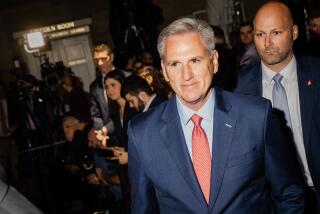Europeâs leaders stick with accord to limit public spending
Reporting from London â European leaders grappling with a stubborn debt crisis reaffirmed their commitment Monday to sign a new pact limiting public spending, but pledged also to spur growth and create jobs in an acknowledgment that austerity cuts alone will not pull the continent out of its economic funk.
European Union officials said they would make special efforts to tackle youth unemployment, which has swelled to alarming levels in countries such as Spain. They promised to increase apprenticeships, remove impediments to further liberalize trade within the EU and dip into an untapped pot of more than $100 billion in development funds to launch new projects.
Of the EUâs 27 member states, 25 restated their intention to sign an accord to prevent reckless government spending by giving Brussels more oversight over their national budgets and penalizing countries that stray. The new treaty is to be ready by March.
Opting out are Britain, which rejected the proposal when it was first put forward last month, and the Czech Republic, which reversed its previous decision to join because of constitutional objections. Neither country is among the 17 that use the euro currency.
The measures are Europeâs latest attempt to stanch the euro debt crisis after more than two years of unsuccessful stopgaps. Until now, the focus has been almost exclusively on forcing heavily indebted nations to make harsh public spending cuts to whip their budgets into line, but there is a growing consensus that ever-greater austerity is crippling economies, not putting them back on their feet.
âWe recognize that financial stability is in itself not enough to get out of the economic crisis,â EU President Herman Van Rompuy said. âWe must do more, in particular on economic growth and employment.â
The new treaty on fiscal discipline is designed to give investors confidence that there wonât be a repeat of the runaway budget deficits that have thrown the viability of the euro into doubt. Greece, Portugal and Ireland have all had to accept international loan packages in order to keep paying their bills; worries have spread to Spain and Italy, whose economies are considered too big to bail out.
At Mondayâs summit in Brussels, EU leaders approved bringing a beefed-up European rescue fund online in July, earlier than originally scheduled. But they put off until March the question of whether the $650-billion fund will be big enough to reassure the markets.
While officials sought Monday to emphasize their intent to strengthen the EU as a whole, much of the attention of investors and analysts has refocused in recent days on the spark that lit the debt conflagration: Greece.
The Mediterranean nation is locked in tough negotiations with private creditors on a complex plan that would see bondholders take a heavy hit on their investment returns to help reduce Greeceâs staggering debt load. Fitful progress on a deal has raised hopes that it could be completed this week, but such desires have been dashed before.
Without an agreement in place, Athens will not receive a desperately needed second bailout from its fellow Eurozone countries, setting up a potentially catastrophic bankruptcy when a major bond repayment comes due in March.
EU officials are also increasingly concerned that the size of the agreed-upon second bailout, a package worth $170 billion, will be inadequate with the Greek economy now in free fall. At the same time, Germany, Europeâs paymaster, and other like-minded countries are reluctant to lend Greece any more money out of anger over Athensâ repeated failure to make good on promises to further slash public spending, beef up tax collection and privatize some government assets.
A German proposal, leaked over the weekend, that the Eurozone appoint an overseer with veto power over Greeceâs budget decisions was met with outrage in Athens, which branded any such move an intolerable infringement on its rights as a sovereign nation. The Greek finance minister warned that Berlinâs idea ignored âbasic historical lessons,â an oblique reference to Germanyâs power-hungry Nazi past.
On Monday, German Chancellor Angela Merkel appeared to back away from the proposal. French President Nicolas Sarkozy, who with Merkel forms the EUâs power couple, also dismissed it as undemocratic.
âThis is a sovereign country that has to do its work by itself,â Sarkozy said of Greece. âOne cannot put a country under guardianship, as it were, and run it from abroadâ¦. Ultimately, it wouldnât be very efficient.â
More to Read
Sign up for Essential California
The most important California stories and recommendations in your inbox every morning.
You may occasionally receive promotional content from the Los Angeles Times.











